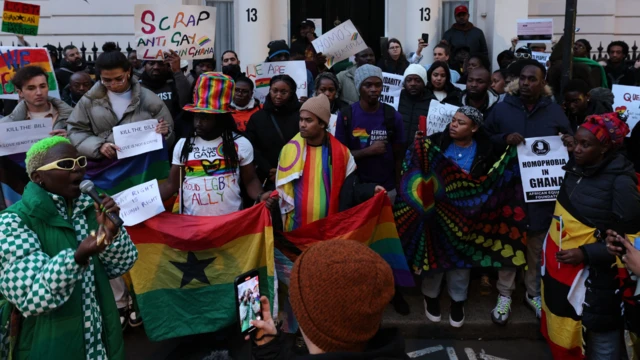Ghana’s Supreme Court Dismisses Challenges to Anti-LGBTQ Bill: What’s Next?
On December 18, 2024, Ghana’s Supreme Court dismissed two pivotal legal challenges against the Human Sexual Rights and Family Values Bill, widely known as the anti-LGBTQ bill. This landmark decision paves the way for President Nana Akufo-Addo to consider signing the bill into law, marking a controversial turn in Ghana’s legal and social landscape.
But what does this mean for Ghana and the broader discourse on LGBTQ rights in Africa?
Let’s explore this further.
Supreme Court Ruling: Key Takeaways
Legal Challenges Rejected
The Supreme Court dismissed petitions filed by journalist Richard Dela Sky and academic Amanda Odoi. The petitioners argued that the bill:
- Violates constitutional rights, including freedom of expression and association.
- Was rushed through Parliament without adhering to proper legislative procedures.
However, Justice Avril Lovelace-Johnson, leading the seven-member panel, emphasized that the court's intervention would be "premature" since the bill has not yet been signed into law. This ruling shifts the responsibility to President Akufo-Addo, whose decision is now eagerly anticipated.
What’s Inside Ghana’s Anti-LGBTQ Bill?
The Human Sexual Rights and Family Values Bill proposes some of the most restrictive measures against LGBTQ individuals in Africa, including:
Prison Sentences:
- Up to three years for individuals identifying as LGBTQ.
- Up to five years for promoting, sponsoring, or participating in LGBTQ-related activities.
Criminalization of LGBTQ Advocacy:
- Advocacy groups or organizations supporting LGBTQ rights would face strict penalties.
Gender Reassignment Surgery:
- Performing or undergoing gender reassignment surgery would be deemed illegal.
Public and Global Reactions
Domestic Support
The bill enjoys widespread support among conservative groups in Ghana, who argue that it reflects the country's cultural and moral values. Religious leaders and traditionalists have been vocal proponents, framing the legislation as a defense of “family values.”
International Backlash
Global human rights organizations, including Amnesty International and the United Nations, have condemned the bill, labeling it a violation of fundamental human rights.
Countries in Europe, where LGBTQ rights are broadly recognized, have urged Ghana to reconsider. Some have warned that passing the bill could jeopardize Ghana’s access to billions in international aid and financing.
What Happens Next?
Presidential Decision
President Akufo-Addo has, until now, withheld his signature, awaiting the court’s decision. With the legal obstacles removed, he faces intense pressure from both sides:
- Supporters demand he signs the bill before his term ends on January 7, 2025.
- Opponents hope for a veto, citing Ghana’s commitment to international human rights conventions.
Impact on Ghana’s LGBTQ Community
If enacted, the bill could lead to heightened discrimination, harassment, and violence against LGBTQ individuals in Ghana. Activists fear the legislation will further isolate and endanger an already marginalized community.
A Broader Perspective: LGBTQ Rights in Africa vs. Europe
Africa’s Stance
Ghana’s proposed law reflects a broader trend across Africa, where many countries have enacted or are considering anti-LGBTQ legislation. This reflects deeply rooted cultural and religious beliefs that oppose non-heteronormative lifestyles.
Europe’s Advocacy
In contrast, Europe has become a beacon for LGBTQ rights, with many nations legalizing same-sex marriage and implementing robust anti-discrimination laws. However, this advocacy has led to tensions, as some African leaders perceive Europe’s pressure as a form of neocolonialism.
FAQs:
Why is Europe pressuring Africa to implement LGBTQ rights?
Europe’s advocacy is rooted in human rights principles, but African leaders argue it conflicts with their cultural and religious values.What are LGBTQ rights in Africa like?
LGBTQ individuals face widespread discrimination, with several countries criminalizing same-sex relationships.How does Ghana’s anti-LGBTQ bill compare globally?
It ranks among the most restrictive, with severe penalties for both individuals and advocates.
Implications for Ghana
Social Division
The bill has deepened divisions within Ghana, with supporters and opponents clashing over its moral and legal implications.Economic Risks
Passage of the bill could strain Ghana’s relations with international donors, potentially affecting foreign aid and trade partnerships.Global Reputation
Ghana risks being labeled a violator of human rights, which could tarnish its image on the global stage.
Conclusion
Ghana’s Supreme Court decision has set the stage for one of the country’s most consequential legal and social debates. As the world watches, the final decision rests with President Nana Akufo-Addo. His choice will shape Ghana’s future and contribute to the global discourse on LGBTQ rights, cultural sovereignty, and human dignity.
This is more than just a legal matter; it’s a defining moment for Ghana, Africa, and the world.



